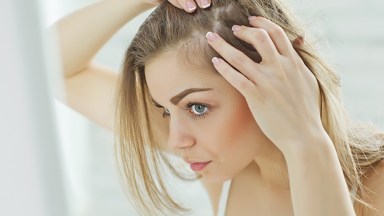
While there are many factors of poor nutrition that are well known, including weight gain and acne to name a few, there’s also another terrifying side effect that many people don’t know about – hair loss. Dr. Chris Varona, hair restoration specialist, spoke to HollywoodLife EXCLUSIVELY, regarding how your diet is affecting your hair growth and what you should be eating instead to stop yourself from balding and live a healthier life. “Hair loss, no matter what the cause can have a significant impact on people’s lives,” Dr. Varona admitted. “For women, there are many factors that can lead to hair loss and most of the time there are multiple factors contributing to the loss. Of course, women can have inherited genetic loss, called Female Pattern hair loss. Other factors can include vitamin deficiencies, anemias such as iron deficiency anemia, stress-induced hair loss, thyroid abnormalities, or traction alopecia from tight hairstyles or aggressive processing of the hair leading to superficial burns of the skin,” Dr. Varona continued. “For women experiencing hair loss, it’s important to seek early attention because many of these factors can be modified, which can result in the improvement of quality and volume of the hair.”
Dr. Varona, who is also the owner of Varona Hair Restoration in Newport Beach, Calif., revealed why you need to change your diet, “If you’re not putting the right fuel in, your hair may not be getting the nutrition that it needs to thrive. For some, a few simple changes in their diet can have a dramatic effect on their hair’s appearance and health, and in many cases, if the diet deficiencies are addressed, hair loss stops or reverses. In terms of nutrition and healthy hair, the American diet typically covers the basics. However, making sure you have things in your diet like magnesium, biotin, zinc, iron, and vitamins A, B, C, and E can help keep hair strong and volume optimal.”
Some of the most important nutrients Dr. Varona explains are essential for preventing hair loss include essential fatty acids. “Omega-3 fatty acids nourish and protect hair, help in regrowth, and add a silky shine. Fatty fish like salmon has lots of omega-3, and walnuts, chia seeds, flaxseeds, and soybeans are also a good source of this healthy hair nutrient.” B vitamins and Vitamin D are also essential, as Dr. Varona shared, “B vitamins help create red blood cells, which carry oxygen and nutrients to the scalp and hair follicles. You can find B6 in bananas and potatoes, B12 in meat and dairy products, and folic acid in citrus fruits and tomatoes.” Meanwhile, “Vitamin D keeps the skin, bones, and hair healthy. Some studies have linked vitamin D deficiency to hair loss. You can find vitamin D in fatty fish, liver, egg yolks, and in fortified foods like milk.”
Other nutrients to include are proteins, iron, and trace minerals. “If you’re short on protein, your hair won’t thrive,” Dr. Varona admitted. “Animal products like meat, fish, and eggs are a good source of protein. You can also get protein from plants, including beans, lentils, nuts, and grains.” As for iron, “It is especially common in women with heavy menstrual periods and is easily mistaken for female pattern baldness,” Dr. Varona shared. “Meats including chicken, fish, and red meats are good sources of easily absorbable iron. Plant sources of iron include beans and lentils, dark leafy greens, and potatoes. Many types of bread and cereals are also enriched with iron.” Trace minerals, which include iron, chromium, copper, zinc, iodine, manganese and selenium, are also quite important. Dr. Varona suggests, “A daily multivitamin can be helpful to ensure you’re getting those vitamins and minerals that your body, and your hair, need most.”